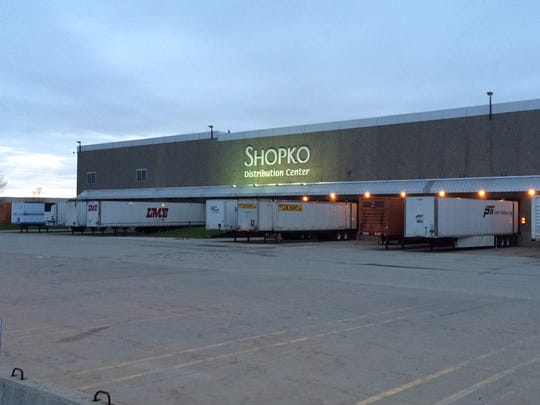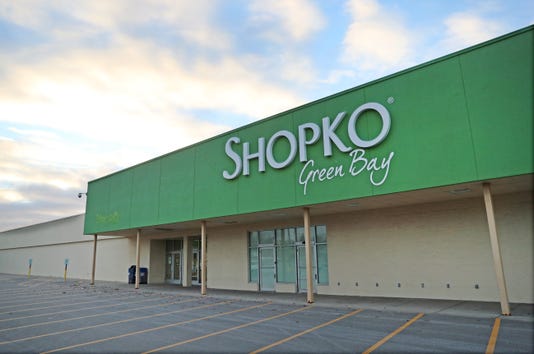Pharmaceutical supplier owed $67 million says Shopko to file for bankruptcy Jan. 15
Jeff Bollier, Green Bay Press-Gazette Published 3:51 p.m. CT Jan. 7, 2019 | Updated 5:48 p.m. CT Jan. 9, 2019
The Shopko store at 216 S. Military Ave. in Green Bay. (Photo: Jim Matthews/USA TODAY NETWORK-Wisconsin)Buy Photo
CONNECTTWEETLINKEDINCOMMENTEMAILMORE
GREEN BAY - Shopko could file for bankruptcy protection from creditors as soon as next week, according to a pharmaceutical drug supplier that says the retailer owes it $67 million.
Jeff Garfinkle, an attorney for San Francisco-based McKesson Corp., said during a hearing Monday in Brown County Circuit Court, that Shopko is expected to file for bankruptcy on Jan. 15.
The companies were in court for a hearing on McKesson's request for a restraining order to keep Shopko from selling medications it supplied the Ashwaubenon-based retailer. McKesson claims it has provided Shopko with $67 million in drugs since Nov. 11, but has not been paid since early December.
McKesson's lawyers argued the company's ability to recoup that debt would be impaired if the Ashwaubenon-based retailer seeks protection from creditors under Chapter 11 of the U.S. Bankruptcy Code.
"The only way to preserve a remedy for McKesson, which has provided $67 million of goods to Shopko and not been paid for it, is to stop them from selling the goods," said David Lucey, an attorney for McKesson.
A Shopko spokesperson did not return messages or answers to a series of questions provided via email. Sun Capital Partners, Shopko's parent company, declined to comment Monday evening.
Brown County Judge William Atkinson rejected McKesson's request for a restraining order.
Stephen Hackney, an attorney for Shopko, said McKesson's request would require it to close its pharmacies, and perhaps even whole stores, potentially harming patients who need life-saving medications. He said it also would threaten the sale of some of its pharmacy business and customer lists to Kroger, Hy-Vee and other competitors, a key step in the company's effort to restructure.
"I do not believe it is safe for citizens, residents ... and patients if I grant your order," Atkinson told McKesson's attorneys Monday morning. "There would be significant public health effects. The public harm, I don't think it can be understated."
The civil case, filed Friday in Brown County, provides some insights into Shopko's financial condition one month after it announced plans to close 39 stores and sell parts of its pharmacy business.
Shopko CEO Russ Steinhorst was in court Monday, but Hackney declined a request for an interview with Steinhorst and directed USA TODAY NETWORK-Wisconsin to the company's media representative.
Hackney said the sale of the pharmacy business is expected to net the retailer in excess of $100 million, money that is key to turning around the struggling business.
McKesson filed court documents seeking the restraining order on Friday in response to growing concerns in recent months about Shopko's ability to pay its debt. Atkinson scheduled the company's civil claims to return to Brown County Circuit Court for a hearing on Jan. 24.
In mid-December, Shopko had to initiate a wire transfer to pay its past-due bill.
McKesson grew more concerned about the company's finances and negotiated the payment period down from 45 days after receipt to 21 days. But on Dec. 27, Shopko did not make a scheduled payment and McKesson announced it would no longer sell inventory to the company.
In a Dec. 27 email, Steinhorst told a McKesson executive that he did not have the authority to release payments to McKesson. On Dec. 31, Shopko executives emailed McKesson again to say the company would not pay McKesson for drugs received and would not commit to a future date when payments would be made.

Additional court documents and testimony on Monday indicated Shopko has a $600 million loan from Wells Fargo on which it owes $570 million.
McKesson also claimed in its affidavits that Shopko was not paying other suppliers, including one of its own subsidiaries that's owed more than $60,000.
Hackney refuted the claims as baseless. He said McKesson did not provide more examples and noted that the company paid more than $200 million to suppliers in December alone.
Communities fight store closings
The claim that bankruptcy is imminent comes at a time when small communities with Shopko stores are bracing for pending store closures.
In Kimball, Nebraska, population 2,400, residents have started a change.org petition to convince the company to reconsider its plan to close the store. The petition now has more than 1,300 signatures. Similar petitions have been launched in four towns in North Dakota, one in Montana and one in Illinois.
Shopko has struggled in recent years alongside national brands such as Sears, Toys R Us and Bon-Ton Stores Inc., which have all sought court protection from creditors. Several of the stores, like Shopko, were bought in the last two decades by private equity firms.
Former Shopko CEO Peter McMahon left the company in December 2016 in search of a "new better challenge." In July 2017, the company promoted Steinhorst to interim CEO before making the appointment permanent in late 2017 The company did not announce leadership changes, but McMahon did so in a couple of tweets.
Florida-based Sun Capital Partners Inc. bought Shopko for $1.1 billion in 2005, according to Bloomberg. The next year, it sold most of the retailer's real estate to Spirit Realty for $815 million, according to PR Newswire. In 2012, the company acquired 193 Pamida locations.
In January 2018, Spirit Realty loaned Shopko $35 million at 12 percent interest with quarterly payments of nearly $600,000 each starting in November. Spirit spun off its Shopko real estate into a separately owned real estate investment trust, called SMTA, on May 31. The trust owns 90 Shopko stores.
In a report filed with the Securities and Exchange Commission in November, Spirit indicated it remains concerned about Shopko's ability to meet its lease obligations.
Around the time of the 2018 loan, a Shopko PowerPoint presentation, still available on the internet, indicated the company's plans to combat deteriorating financial results in 2016 and 2017 involved a corporate reorganization, increasing the volume of higher-margin private brand products for sale, increasing in-store efficiency and finding growth opportunities.
The retail chain was founded by pharmacist James Ruben in 1962 on Green Bay's west side. It currently operates more than 360 stores in 24 states.
According to court documents, Shopko has about 5,000 employees in Wisconsin. The 2017 Greater Green Bay Chamber Fact Book reports the company employed about 1,100 people in Brown County.
 Buy Photo
Buy Photo